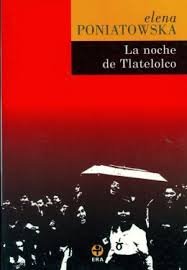
The 2013 edition of the most prestigious prize in Spanish letters goes to the Mexican writer and journalist Elena Poniatowska (Paris, 1932), only the fourth female laureate in 37 years of the prize’s history.
Verónica Calderón presented her in El País like this (excerpts):
Her most celebrated work, La noche de Tlatelolco [The Tlatelolco night; Massacre in Mexico], is a crude testimony of the repression against students on October 2, 1968, a date etched in blood in Mexico’s history.
The student protests had lasted for weeks and the tension had grown. The army had stormed the centuries old wooden door of the San Ildefonso College by force of a bazooka. The president Gustavo Díaz Ordaz (of the Institutional Revolutionary Party, PRI, that ruled Mexico with absolute power during much of the 20th century) declared: “We have been tolerant to levels of criticized excess.” Ten days before the 1968 Olympics, on Oct. 2, in the afternoon, a flare showed up on the sky during a student meeting in the Tres Culturas de Tlatelolco square. That was the sign for the so-called Olympian Battalion, a paramilitary group, that mingled among the young people and started the repression. Snipers that had been placed on the roofs of the neighboring buildings opened fire. There were dozens, hundreds of deaths. Nobody knows exactly.
Poniatowska remembers that, when she heard of the repression, she decided to go out on the street. She had given birth only a few weeks earlier. “I had to see it with my eyes.” She found a desolate scene. “Dry blood, soldiers in the street, scattered shoes all over the place. This was the origin of La noche de Tlatelolco. The memory still moves her. [Years later she had to change some paragraphs as a former student leader whom she had interviewed for the book, went to court over distortions of his words.]
What touched her most as a direct testimony of Mexico’s recent history was the civic movement after the 1985 earthquake, “one of the few moments when Mexico could look at itself and, what is more, overcome the tragedy.” From the rubble rose an unprecedented civic sentiment, solidary and that brought the nation’s capital back to its feet after the quake that caused thousands of deaths. Out of this experience, Poniatowska wrote Nada, nadie: las voces del temblor [Nothing, Nobody: the Voices of the Mexico City Earthquake], though she prefers that of a friend of hers, Carlos Monsiváis, No sin nosotros [Not without us], whom she misses a lot (Monsiváis died in 2010).
She is a woman committed to what she believes in. She becomes outraged. For a country in which half of the population lives in poverty. Where injustices towards women are an everyday fact. Where neoliberalism has devoured small towns and the countryside. “In Mexico we no longer take the time to live, to converse.” And she guards a desire. ” I would like to see a leftist Mexican president.”
She has also been a political activist, first in 1988 with Cuauhtémoc Cárdenas, and more recently with Andrés Manuel López Obrador, former mayor of Mexico City and two times presidential candidate.
She does not like it that they call her “Elenita”. She thinks it “infantilizes”. Is this machista? “Maybe a little bit.” She narrates that Frida Kahlo, the mythical Mexican painter, was called “the lame one”: “Today everybody is enthusiastic about her, but then they referred to her like this. Male chauvinism [machismo] is very cruel.” One of Diego Rivera’s women is the protagonist of one of her books, a small but endearing work: Querido Diego, te abraza Quiela [Dear Diego (, hugs from Quiela)]. Written by way of letters, it tells the wretched love story of the painter Angelina Beloff and the Mexican muralist, who were a couple when he lived in Paris. When Beloff travels to Mexico to meet her loved one, she finds out that he has got a new woman: Lupe Marín, who would be the mother of his two youngest daughters.
Women – creative ones, courageous ones, those who go against the tide – are a constant in Poniatowska’s work. She is a meticulous portraitist of feminine feminism. Of delicate appearance but with a military firmness. Like that of the painter Leonora Carrington (Leonora), or that of the fotographer Tina Modotti (Tinísima). Or that of a woman who so accomplished ends up explaining to the judge why she has got five husbands (De noche vienes, Esmeralda [You come at night, E.]), or that of a brave female soldier – the women that went to the front during the Mexican Revolution – who ends up working as a washerwoman in Mexico City (Hasta no verte, Jesús mío [Here’s to You, Jesusa]). (And also the non-fictional Las Soldaderas: Women of the Mexican Revolution)
The frequent talking rounds (bees (?)) are also attended by a black dog and two cats who do not hesitate to sit on the visitor’s lap: Monsi and Váis, in honor of her passed away friend. She spends whole afternoons chatting and drinking tea, surrounded by books. It is difficult to tame her curiosity. A small inattention and the interviewer becomes the interviewed. Does she know that she has been an inspiration for a generation of female Mexican journalists? “No, imagine. How nice. There should be more women willing to tell things. There is still a lot to be told.”
El País has had more articles on Poniatowska… The Wikipedia article is quite exhaustive and shows an impressive bibliography, of which some works have been translated into English.








